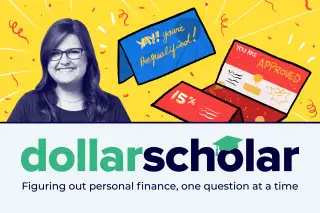Dollar Scholar Asks: What Does Being Preapproved for a Credit Card Really Mean?

This is an excerpt from Dollar Scholar, the Money newsletter where managing editor Julia Glum teaches you the modern money lessons you NEED to know. Don't miss the next issue! Sign up at money.com/subscribe and join our community of 160,000+ Scholars.
In these unprecedented times — amid tariffs and the rumored Supernatural reunion — there's one thing I can count on. And it's that every couple of weeks, Venmo will email me about its credit card.
"You've been invited to apply for the Venmo Credit Card," reads one subject line, which I've received at least twice since January. "You've been selected for a $200 bonus offer with the Venmo Credit Card," reads another, which I got three times in six weeks. "You have excellent approval odds for the Venmo Credit Card," crows a third, which arrived on March 1.
It's nice to be wanted, but this is getting ridiculous.
It's not just Venmo, either. Although its missives are the most frequent, I also receive emails from Wells Fargo and even card stock mailers from American Express to the same effect. I'm suspicious of them all.
What does being 'prequalified,' 'preapproved' or 'invited to apply' for a credit card really mean?
Jennifer Doss, executive editor at CardRatings.com, says the companies aren't sending me compliments because I'm just so amazing. They're using flattering language to persuade me to apply for their products.
Credit card issuers make money from interest, annual fees, late fees and interchange fees, the last of which are fees merchants pay to credit card companies every time a customer uses their card for a transaction. In 2021, interchange fees generated about $31.6 billion.
It's basic business: The more customers a company has, the more transactions they make, the more revenue it can earn. They want me to apply. And in a sea of other emails and competing offers, one easy way to stand out is to make me feel exclusive.
In reality, Doss says preapprovals happen when a credit card issuer evaluates someone's credit profile using a soft pull "just to see" if they meet its predetermined criteria for a certain product. Preapprovals are similar to prequalifications, which customers may initiate themselves or require a bit more information to generate.
The terms are used interchangeably, but "neither mean that you're guaranteed for approval," she says.
While it's not a total shot in the dark — Doss says credit card issuers have "processes in place to make sure they're targeting the appropriate candidates" — it's far from a sure thing.
"You have a very good shot," she adds. "The issuer has already looked at your credit profile, and there's probably a really good chance that you will be approved for the credit card. But whatever term you use, there's never an actual guarantee."
Opening a credit card typically requires a customer to legitimately apply, which involves signing off on a hard inquiry into their credit so an issuer can review their payment history, income and so on. I can't be approved until all of that happens.
No matter what phrase a company is using (preselected, prequalified, preapproved, invited to apply, et cetera), the messaging can be dangerous. Erika Wasserman, a certified financial therapist, says it could sound particularly attractive to someone struggling with their finances.
Wasserman likens preapprovals to loss leaders, which are products stores intentionally sell below their market price in order to generate some other benefit.
Think about Costco's famous $1.50 hotdog combo: While the company isn't making big bucks off the deal itself, the combo attracts customers, getting them in the door so they can be sold other, more expensive items that will contribute to the bottom line.
"Business owners and businesses don't give anything away for free if they don't have a long-term plan to back up how they're going to recoup that money," Wasserman says.
So if I don't need a new card or I know I'm susceptible to overspending, she says the best response is to "delete, delete, delete" any random email promoting a flashy credit card offer.
I can also take it one step further. Visiting OptOutPrescreen.com or calling 1-888-5-OPTOUT will let me take my name off of the preapproval lists that major credit firms like Equifax, Experian, TransUnion and Innovis turn over to credit card companies. The request usually takes five days to process.
But if I generally have my spending under control, the Federal Trade Commission points out that it might not necessarily be a bad idea to keep the offers coming. Preapprovals don't hurt my credit score. They can help me comparison-shop and might snag me a more favorable offer than is advertised to the general public.
The bottom line
Being prequalified, preselected, preapproved or invited to apply for a credit card means that its issuer has done a cursory check of my credit and thinks I might be a good candidate. It's not a guarantee that my application will be approved or that the card is right for me.
If I'm on the hunt for a new credit card, Doss suggests I look at several different options, think about my spending habits and consider what kind of card might be a practical fit for my lifestyle rather than diving right into a sea of offers.
"Don't just get so excited you think you're going to get approved that you apply for the first one that comes in the mail," she adds.
More from Money:
Is It OK to Put Stickers on My Credit Card?